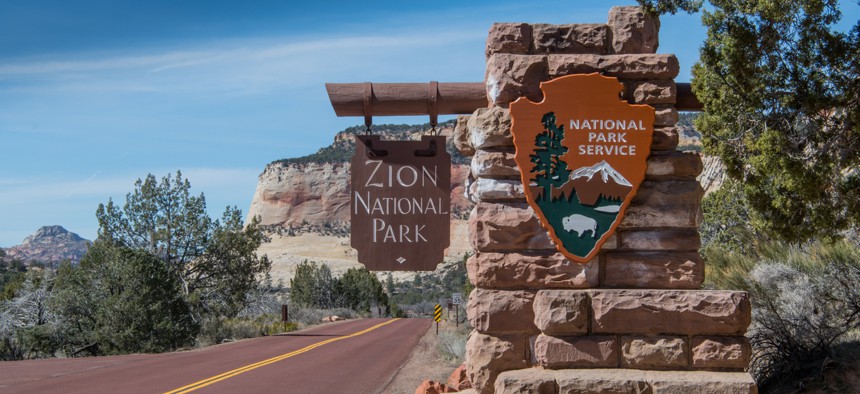
kellyvandellen / istock
A 2019 Report Found National Parks Employees Felt Abused and Harassed, but the Agency Never Released It
NPS says it was working on putting the report out before the pandemic hit.
National Park Service employees told consultants hired by the agency in 2018 that they felt disrespected, consistently witnessed or experienced abusive behavior and generally were subject to a toxic work environment. But agency leadership never disclosed the results of that review internally or externally.
The report came to light only after Public Employees for Environmental Responsibility disclosed it on Monday. The National Park Service subsequently distributed it to employees and posted it on its website. PEER accused NPS of seeking to bury the report, and while the agency said it has made progress on improving its culture, it conceded the report’s delayed release could have negative consequences. NPS commissioned the report—carried out by Sepler and Associates, a firm with experience in workplace investigations—following high-profile cases of rampant abuse and a 2017 investigation that found 35% of employees reported experiencing harassment in the previous 12 months.
Jenny Anzelmo-Sarles, an NPS spokesperson, said the agency received the report in late-2019 and was preparing for its distribution when the COVID-19 pandemic began.
“We recognize our delay in sharing the report could have the unintentional consequence of impacting our efforts to build confidence and trust with employees,” Anzelmo-Sarles said.
The report found myriad issues with NPS as an organization, ranging from an unresponsive human resources staff to understaffing causing employees to be “stretched to breaking.” Sepler and Associates engaged in a “voices tour” starting in 2018 and heard from more than 1,200 employees. Employees frequently said the hiring process was pervaded by cronyism, as supervisors “manipulated” selections to arrange for predetermined individuals to take the roles. They expressed “universal” concern about the vulnerability of seasonal staffers, who suffered additional abuse due to their employment insecurity.
The workers frequently suggested that complaints were not dealt with and issues related to higher-ranking employees went ignored. Retaliation occurred frequently, they said, while problem employees were transferred or promoted. Supervisors said they were unclear on how to address complaints, or did not have the right tools to do so.
“Unfortunately, by burying this report, the NPS has not only turned a deaf ear to a cry for help from its own workforce but may have made a bad situation worse,” said Tim Whitehouse, PEER’s executive director, in a letter to Chuck Sams, President Biden’s nominee to lead NPS.
Anzelmo-Sarles pushed back on the suggestion there was any effort to bury the report, noting NPS had already begun rolling it out to various leadership teams pre-pandemic. The vast majority of the agency's workforce, however, was not aware of the report’s findings until PEER published them on Monday.
In the “voices tour” report, Sepler and Associates said that perhaps the “strongest message” from the report was that NPS take action in response to the stories employees were sharing. Action was necessary to “validate the integrity” of the project, they said.
Then-Interior Secretary Ryan Zinke attempted to crack down on harassment at the department in 2017, announcing a new, zero-tolerance policy following reports of pervasive issues. NPS said on Monday eliminating harassment remains a top priority and noted it has launched a new reporting and accountability process to centralize employee complaints. It has also established new anti-harassment training efforts and sought to boost diversity in the agency.
“One of the most important things we can do is be transparent about what is occurring within the workforce and help break down barriers that dissuade or prevent people from coming forward when they are subject to or witness inappropriate behavior,” Anzelmo-Sarles said. “We continue to encourage people to talk openly and honestly about workplace concerns and NPS leadership remains committed to being open and transparent with employees about these issues.”
In its report, Sepler and Associates found employees wanted more emotional leadership and conflict management skills from leadership. Many women reported a prevailing “old boys club” among the upper ranks of management. Employees said “uncivil and abusive behavior” was embedded in the culture of certain parks. More than 1 in 4 participants in the review said such behavior is openly accepted, while half said it took place and went unaddressed. Disrespectful behavior occurred always or often to 55% of employees who spoke to the investigators.
The company recommended that Interior get rid of its zero-tolerance policy, calling it unrealistic and insufficiently refined for dealing with behavior that could range from minor to severe offenses. It advised NPS to create new tool kits, training models and employee evaluation models to make its workplace fairer and to offer recognition and rewards for supervisors who improve the culture at their workplaces.
Whitehouse called on Sams to take more concrete actions in response to the report’s findings, including holding accountable those who failed to distribute it or who allow harassment to fester.
“The challenge of raising those dashed hopes will fall to you,” Whitehouse said. “It is not too late to answer the alarm sounded in the NPS Voices 2018 report. However, changing the dynamics pervasive within the NPS will take more than words; it will require removing senior leaders who perpetuate this toxic culture.”







